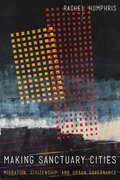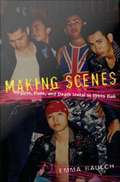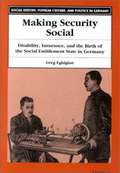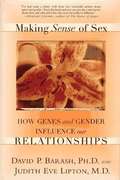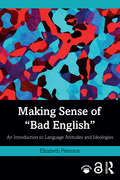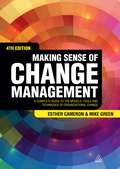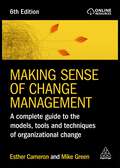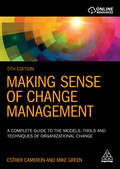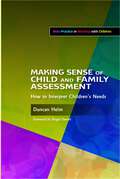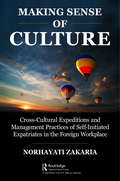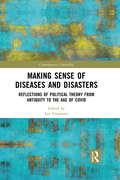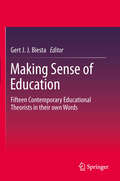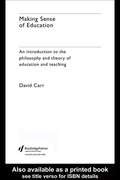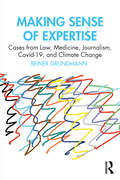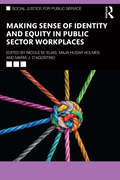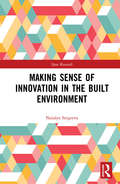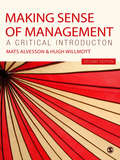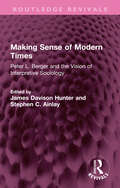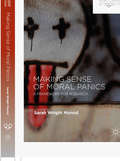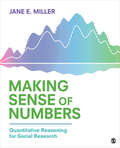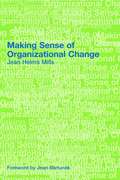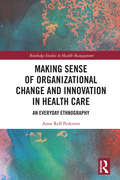- Table View
- List View
Making Sanctuary Cities: Migration, Citizenship, and Urban Governance (Anthropology of Policy)
by Rachel HumphrisFrom its development in the 1980s, the sanctuary city movement—municipal protection of people with uncertain migration status from national immigration enforcement—has been a powerful and controversial side of progressive migration policy reform. While some migration activists view sanctuary city policy as the most important aspect of their work, others see it as actively impairing efforts in the fight for migrant rights. In Making Sanctuary Cities, Rachel Humphris provides a new understanding of how citizenship is negotiated and contested in sanctuary cities and what political potentials are opened (and closed) by this designation. Through long-term fieldwork across the sanctuary cities of San Francisco, Sheffield, and Toronto—three of the first municipalities to adopt this designation in their respective countries—Humphris investigates the complexity of sanctuary city policy. By capturing the wide-ranging meanings and practices of sanctuary in comparative context, Humphris uncovers how liberal citizenship is undermined by the very thing that makes it worth investing in: the promise of equality. Attending to the tensions inherent in sanctuary policy, this book opens vital questions about the ways governing systems can extinguish political ideals, and how communities choose to live and organize to fight for a better world.
Making Scenes: Reggae, Punk, and Death Metal in 1990s Bali
by Emma BaulchIn 1996, Emma Baulch went to live in Bali to do research on youth culture. Her chats with young people led her to an enormously popular regular outdoor show dominated by local reggae, punk, and death metal bands. In this rich ethnography, she takes readers inside each scene: hanging out in the death metal scene among unemployed university graduates clad in black T-shirts and ragged jeans; in the punk scene among young men sporting mohawks, leather jackets, and hefty jackboots; and among the remnants of the local reggae scene in Kuta Beach, the island's most renowned tourist area. Baulch tracks how each music scene arrived and grew in Bali, looking at such influences as the global extreme metal underground, MTV Asia, and the internationalization of Indonesia's music industry. Making Scenes is an exploration of the subtle politics of identity that took place within and among these scenes throughout the course of the 1990s. Participants in the different scenes often explained their interest in death metal, punk, or reggae in relation to broader ideas about what it meant to be Balinese, which reflected views about Bali's tourism industry and the cultural dominance of Jakarta, Indonesia's capital and largest city. Through dance, dress, claims to public spaces, and onstage performances, participants and enthusiasts reworked "Balinese-ness" by synthesizing global media, ideas of national belonging, and local identity politics. Making Scenes chronicles the creation of subcultures at a historical moment when media globalization and the gradual demise of the authoritarian Suharto regime coincided with revitalized, essentialist formulations of the Balinese self.
Making Security Social: Disability, Insurance, And The Birth Of The Social Entitlement State In Germany
by Greg EghigianWhile welfare has been subject to pronounced criticism throughout the twentieth century, social insurance has consistently enjoyed the overwhelming support of European policy makers and citizens. This volume argues that the emergence of social insurance represents a paradigmatic shift in modern understandings of health, work, political participation, and government. By institutionalizing compensation, social insurance transformed it into a right that the employed population quickly came to assume. Theoretically informed and based on intensive archival research on disability insurance records, most of which have never been used by historians, the book considers how social science and political philosophy combined to give shape to the idea of a "social" insurance in the nineteenth century; the process by which social insurance gave birth to modern notions of "disability" and "rehabilitation"; and the early-twentieth-century development of political action groups for the disabled. Most earlier histories of German social insurance have been legislative histories that stressed the system's coercive features and functions. Making Security Social, by contrast, emphasizes the administrative practices of everyday life, the experience of consumers, and the ability of workers not only to resist, but to transform, social insurance bureaucracy and political debate. It thus demonstrates that social insurance was pivotal in establishing a general attitude of demand, claim, and entitlement as the primary link between the modern state and those it governed. In addition to historians of Germany, Making Security Social will attract researchers across disciplines who are concerned with public policy, disability studies, and public health. Greg Eghigian is Associate Professor of History, Penn State University.
Making Sense Of Sex: How Genes And Gender Influence Our Relationships
by David P. Barash Judith Eve LiptonWhy do most women prefer romance, and men, sex? Why do women live longer than men? Why are men willing to pay for sex while women almost never are? Why are women nearly always the primary caregivers of young children? What happens when a man's brain is trapped in a woman's body? When is a short, balding middle-aged man more attractive than a tall, handsome, young one? In Making Sense of Sex, the husband-and-wife team of David Barash, an evolutionary biologist, and Judith Lipton, a clinical psychiatrist, draw on their respective areas of expertise to explore and explain the central fact of our existence -- that men and women are fundamentally, unalterably different. They present an eye-opening and wide-ranging consideration of what those differences are, how they came to be, why they are important, and what they mean in our everyday lives. The authors integrate biological and anthropological findings with real-life stories of indviduals to address the conundrums that surround male-female behavior and relationships. Drawing on the latest research in evolutionary biology, they trace the multifaceted gender gap to the basic, defining difference between males and females: that one makes sperm, the other, eggs. They show how that distinction explains why women and men differ in essential ways, exploring such questions as: Why are men more attracted than women to pornography, group sex, and one-night stands? Why are women the "gatekeepers" of sex? Why do women have orgasms?Making Sense of Sex is a highly informative and entertaining look at human relationships. The book will help readers not only to better understand themselves, but to better understand their children, their relatives, and their lovers with whom they share so much yet find so infuriatingly and fascinatingly different.
Making Sense of "Bad English": An Introduction to Language Attitudes and Ideologies
by Elizabeth PetersonWhy is it that some ways of using English are considered "good" and others are considered "bad"? Why are certain forms of language termed elegant, eloquent or refined, whereas others are deemed uneducated, coarse, or inappropriate? Making Sense of "Bad English" is an accessible introduction to attitudes and ideologies towards the use of English in different settings around the world. Outlining how perceptions about what constitutes "good" and "bad" English have been shaped, this book shows how these principles are based on social factors rather than linguistic issues and highlights some of the real-life consequences of these perceptions. Features include: an overview of attitudes towards English and how they came about, as well as real-life consequences and benefits of using "bad" English; explicit links between different English language systems, including child’s English, English as a lingua franca, African American English, Singlish, and New Delhi English; examples taken from classic names in the field of sociolinguistics, including Labov, Trudgill, Baugh, and Lambert, as well as rising stars and more recent cutting-edge research; links to relevant social parallels, including cultural outputs such as holiday myths, to help readers engage in a new way with the notion of Standard English; supporting online material for students which features worksheets, links to audio and news files, further examples and discussion questions, and background on key issues from the book. Making Sense of "Bad English" provides an engaging and thought-provoking overview of this topic and is essential reading for any student studying sociolinguistics within a global setting.
Making Sense of Change Management
by Mike Green Esther CameronThe world we live in continues to change at an intense rate. In order to succeed over the next few years, organizations must adapt to tough market conditions by changing their strategies, their structures, their boundaries and of course their expectations of staff and managers.Ideal reading for anyone who is currently part of or leading a change initiative, Making Sense of Change Management, 4th edition, is the definitive text in the field of change management. Aimed at students and professionals alike, it provides comprehensive coverage of the models, tools and techniques of successful change management with a focus on individual, team and organizational change to help the reader apply each concept to unique situations.Now with a new chapter exploring the integration of change management with project management, it also contains a completely revised and updated chapter on culture change that takes into account emerging thinking and practice.
Making Sense of Change Management: A Complete Guide to the Models, Tools and Techniques of Organizational Change
by Mike Green Esther CameronHow can organizations effectively navigate times of change? This book provides comprehensive guidance on adapting mindsets, structures and strategies to achieve success.Making Sense of Change Management is a classic text for beginners through to seasoned practitioners, which covers the theories and models of change management and connects them to workable techniques that organizations of all types and sizes can use to adapt to tough market and environment conditions. The updated sixth edition includes an introduction to emerging regenerative mindsets, change processes, and ways of doing and being that will help meet both the urgency and the longer term requirements for change in response to unfolding crises. The book also references the impact of climate change, COVID-19, and other interconnected crises, and illustrates how compassionate, sustainable leadership can positively impact the way change is managed in organizations, and therefore the outcomes for all.This definitive, bestselling text in the field shows how to succeed by changing strategies, structures, mindsets, behaviours and expectations of staff and managers. Supported by thoughtful and provocative questions at the end of each chapter, as well as checklists, tips and summaries to apply knowledge in practice, Making Sense of Change Management remains essential reading for both students and practitioners who are currently part of, or leading, a change initiative. Online resources include international case study question packs and lecture slides with further reflective questions.
Making Sense of Change Management: A Complete Guide to the Models, Tools and Techniques of Organizational Change (The\change Ser.)
by Mike Green Esther CameronThe definitive, bestselling text in the field of change management, Making Sense of Change Management provides a thorough yet accessible overview for students and practitioners alike. Without relying on assumed knowledge, it comprehensively covers the theories and models of change management and connects them to practical approaches and techniques that organizations of all types and sizes can use to adapt to tough market conditions and succeed by changing their strategies, structures, mindsets, leadership behaviours and expectations of staff and managers.This completely revised and updated fifth edition of Making Sense of Change Management contains a new chapter on becoming a sustainable business, new material on the latest developments in technology-led change, further case studies and updated wider content with the latest thinking and developments. Supported by 'food for thought' and 'stop and think' features to aid critical thinking and understanding, as well as checklists, tips and summary boxes, it remains essential reading for anyone who is currently part of, or leading, a change initiative. New and updated online resources include international case study question packs for lecturers and lecture slides with reflective questions.
Making Sense of Child and Family Assessment
by Duncan HelmThe application of assessment frameworks hinges on human qualities and skills which are naturally prone to bias and inconsistency. Making Sense of Child and Family Assessment aims to support workers in analysing and making sense of the information gathered, and increasing accuracy and empathy in assessing the needs and risks for vulnerable children and young people. This book offers best practice guidance on how to analyse information gathered during the assessment of children and young people and their families. Good assessments take time and need to be appropriately resourced. A range of analytical tools are also needed if practitioners are to present assessments of children's needs which lead to meaningful care plans and improved outcomes. Helm introduces the key messages emerging from policy and research, and provides insights into today's multi-disciplinary practice. Professionals working in child welfare and protection roles, such as social workers, health visitors, midwives and teachers will find this practical guide to analysis invaluable in interpreting needs and outcomes.
Making Sense of Culture: Cross-Cultural Expeditions and Management Practices of Self-Initiated Expatriates in the Foreign Workplace
by Norhayati ZakariaThis book lies within two interdisciplinary fields that should be bridged: cross-cultural management and international human resource management. The consequences of globalization lead to a more extensive recruitment process of global talents to fit the different work structures and competitive work environment of tomorrow. The emergence of self-initiated expatriates (SIEs) further intensify the challenges faced by multinational organizations because people are searching for better career prospects and they are willing to re-locate in order to obtain competitive salary or compensation packages. With the emergence of SIEs, multinational corporations need to acknowledge the influence of culture on management practices because the expatriates will bring their own cultural baggage and uniqueness to the company’s doorsteps. By integrating both fields, this book provides a valuable understanding in order to educate SIEs on the richness of cultural behaviors. Indeed, the complexities of human behaviours opens up the window of opportunities to recognize that we are all human beings with unique characteristics, personality and attitudes. It is until and when we equally acknowledge that culture is an essence of humankind and that culture continues to shape people with a magical touch of diversity and uniqueness, only then will the global world greet people inclusively by embracing ‘tolerance, appreciation, and happiness!’ Culture has a paramount impact on how leaders manage their colleagues and teams in the workplace. One’s attitudes, values, beliefs and perceptions all matter when people work with culturally diverse colleagues. Cultural differences cannot be ignored as a work structure that thrives only in a monoculture environment is hardly in existence for multinational corporation of today. Instead, the multi-cultured environment takes priority with the soaring number of demands for global talents and workforces that need to be recruited. It is clearly established in the field of international human resources that there are increasing trends and phenomenon of burgeoning SIEs in newly occupied cosmopolitan cities in the world such as Dubai, Qatar, Jeddah, Kuala Lumpur, Hong Kong, Shanghai, Tokyo, and many others. At the end, one key question matters for the journey of cultural sense making to begin: What is it like to experience the forces and effects of culture in the workplace when one is an expatriate?
Making Sense of Diseases and Disasters: Reflections of Political Theory from Antiquity to the Age of COVID (Contemporary Liminality)
by Lee TrepanierThis book examines diseases and disasters from the perspective of social and political theory, exploring the ways in which political leaders, social activists, historians, philosophers, and writers have tried to make sense of the catastrophes that have plagued humankind from Thucydides to the present COVID pandemic. By adopting the perspective of political theory, it sheds light on what these individuals and events can teach us about politics, society, and human nature, as well as the insights and limitations of political theory. Including thinkers such as Thucydides, Sophocles, Augustine, Bacon, Locke, Hume, Rousseau, Publius, Bartolomé de las Casas, Jane Addams, Camus, Saramago, Baudrillard, Weber, Schmitt, Voegelin and Agamben, it considers a diverse range of events including the plagues of Byzantium and 14th century Europe, 9/11, the hurricanes of Fukushima, Boxing Day, and New Orleans, and the current COVID pandemic. An examination of past, present, and future diseases and disasters, and the ways in which individuals and societies react to them, this volume will appeal to scholars of politics, sociology, anthropology and philosophy with interests in disaster and the social body.
Making Sense of Education
by Gert BiestaThis volume gives educational theorists the chance to let rip and say what they really want to say. In doing so it sends a blast of fresh air through the dusty halls of academe. The vast majority of the literature in education theory and philosophy follows the conventions of academic writing, and rightly so. Yet its formal, abstract and objective style, which focuses on the careful presentation of theoretical and philosophical arguments, doesn't always give us insights into what motivates and drives the authors--while for academic neophytes it can be dense and arcane. Here, those same theorists and philosophers have been given the chance to expound at length on the topics that most exercise them. What concerns them, what gets them up in the morning, and what really matters most to them? Readers will discover what happens when these thinkers are explicitly invited to go beyond academic conventions and experiment with form, style and content. Featuring collected essays from leading educationalists from Norway, Sweden, Denmark, the USA, Canada, Israel Germany, Belgium and the UK, these essays provide vital insights into their work as well as being a compelling introduction to contemporary attempts to make sense of education through theory and philosophy. All these authors have made key contributions to the field, and their unique 'manifestos' make a fascinating read for any student or practitioner in education.
Making Sense of Education: An Introduction to the Philosophy and Theory of Education and Teaching
by David CarrMaking Sense of Education provides a contemporary introduction to the key issues in educational philosophy and theory. Exploring major past and present conceptions of education, teaching and learning, this book makes philosophy of education relevant to the professional practice of teachers and student teachers, as well of interest to those studying education as an academic subject.The book is divided into three parts: education, teaching and professional practice: issues concerning education, the role of the teacher, the relationship of educational theory to practice and the wider moral dimensions of pedagogy learning, knowledge and curriculum: issues concerning behaviourist and cognitive theories of learning, knowledge and meaning, curriculum aims and content and evaluation and assessment schooling, society and culture: issues of the wider social and political context of education concerning liberalism and communitarianism, justice and equality, differentiation, authority and discipline. This timely and up-to-date introduction assists all those studying and/or working in education to appreciate the main philosophical sources of and influences on present day thinking about education, teaching and learning
Making Sense of Expertise: Cases from Law, Medicine, Journalism, Covid-19, and Climate Change
by Reiner GrundmannCurrent debates about experts are often polarized and based on mistaken assumptions, with expertise either defended or denigrated. Making Sense of Expertise instead proposes a conceptual framework for the study of expertise in order to facilitate a more nuanced understanding of the role of expertise in contemporary society. Too often different meanings of experts and expertise are implied without making them explicit. Grundmann’s approach to expertise is based on a synthesis of approaches that exist in various fields of knowledge. The book aims at dispelling much of the confusion by offering a comprehensive and rigorous framework for the study of expertise. A series of in-depth case studies drawn from contemporary issues, including the climate crisis and the COVID-19 pandemic, provide the empirical basis of the author’s comprehensive approach. This thought-provoking book will be of great interests to students, instructors and researchers in a range of fields in the humanities, social sciences, and science and technology studies.
Making Sense of Human Rights (Second Edition)
by James W. NickelThis fully revised and extended edition of James Nickel’s classic study explains and defends the contemporary conception of human rights. Combining philosophical, legal and political approaches, Nickel explains international human rights law and addresses questions of justification and feasibility.
Making Sense of Identity and Equity in Public Sector Workplaces (Social Justice for Public Service)
by Nicole M. Elias, Maja Husar Holmes, and Maria J. D’AgostinoIdentity and equity in public sector workplaces are two of the most crucial, yet complex, concepts for decision-makers to address. This important new book offers public administration scholars, practitioners, and students a comprehensive resource to make sense of identity and equity in the public sector workplace.The chapters in this volume present original research and explore timely and relevant theories and practices of identity and equity in public sector workplaces. To do this, authors present innovative theories and approaches to identity and equity, analyze practical pathways to identity and equity, and critique foundational policy and law addressing identity and equity. The utility of this volume lies in the timeliness and innovative approaches to evolving concepts of identity and equity in public sector workplaces. Applying a liberatory lens, the chapters reflect an expanded interpretation and understanding of identity, the challenges and opportunities for public sector organizations to more fully embrace and integrate diverse identities in the workplace, and paths for future research and application of practices that strive for more equitable and inclusive workplaces. Making Sense of Identity and Equity in Public Sector Workplaces is essential reading for all students and scholars of public administration as well as those working in public and nonprofit organizations.
Making Sense of Innovation in the Built Environment (Spon Research)
by Natalya SergeevaThis book offers a new understanding of innovation in the built environment. The ways meaning of innovation is constructed has important implications for policymakers, project managers, academics and students. Through a longitudinal research study into innovation in firms and projects, the book addresses some key themes, challenges and concerns that practitioners face when managing innovation in the built environment. It examines the key drivers for innovation in the construction, engineering and infrastructure firms and projects. In particular, the questions of how and why innovation becomes recognised and sustained over time are explored. Different theoretical perspectives are considered to explain different aspects of innovation. This includes sensemaking, organisational and individual identity, storytelling and narration. The book has practical implications for how organisational activities become labelled as ‘innovation’ and for what purpose. It shares some lived stories of innovation as mobilised by practising managers. The connectivity between the formal narratives of innovation at the policy level and the lived narratives of innovation articulated by practitioners is explored. Combining the theory with practice, this book presents an insightful view on the implications of innovation in the business world today.
Making Sense of Management: A Critical Introduction
by Mats Alvesson Hugh WillmottThe first edition of Making Sense of Management set out to provide a fresh perspective on management that was both broad and critical, exploring how the disruptive and constructive potential of critical theory can be realized in organizations. Along the way, it has proven to be a landmark contribution to critical management studies. As well as setting the agenda for current research, this revised edition has been written to appeal to a broader readership and open up critical theory for the general management student.<P> New sections on HRM, brands, identity, ethics and leadership have been fully developed alongside the rest of the text to reflect the current state of play in critical management studies.<P> The second edition of Making Sense of Management will be of interest to students and researchers in critical management studies and students on general management courses with a critical perspective.
Making Sense of Mass Education
by Gordon TaitMaking Sense of Mass Education provides a comprehensive analysis of the field of mass education. The book presents new assessment of traditional issues associated with education - class, race, gender, discrimination and equity - to dispel myths and assumptions about the classroom. It examines the complex relationship between the media, popular culture and schooling, and places the expectations surrounding the modern teacher within ethical, legal and historical contexts. The book blurs some of the disciplinary boundaries within the field of education, drawing upon sociology, cultural studies, history, philosophy, ethics and jurisprudence to provide stronger analyses. It is also accompanied by an extensive companion website which features teaching notes, discussion questions, vignettes and exercises. The book reframes the sociology of education as a complex mosaic of cultural practices, forces and innovations. Engaging and contemporary, it is an invaluable resource for teacher education students, and anyone interested in a better understanding of mass education.
Making Sense of Modern Times: Peter L. Berger and the Vision of Interpretive Sociology (Routledge Revivals)
by James Davison Hunter Stephen C. AinlayPeter Berger (1929-2017) was one of the pre-eminent sociologists of the twentieth century. His highly creative and controversial writing made a distinct impact not only in sociology but in such disciplines as political science, public policy, history, religious studies and theology.Originally published in 1986 Making Sense of Modern Times shows how Peter Berger struggled with the classical legacy of the sociological enterprise – a legacy abandoned by contemporary sociology. Berger made a self-conscious effort to recover this vision. Each of the four sections of the book – Social Theory; Modernization; Religion; The Method and Vocation of Sociology – contains essays which examine Berger’s efforts in the light of these broader issues and assess the degree to which Berger succeeds or fails in his efforts. The book includes a contribution from Berger himself, responding to the preceding essays as well as presenting his own appraisal of the future of interpretive sociology.
Making Sense of Moral Panics
by Sarah Wright MonodThis book offers a comprehensive framework for the study of moral panics. It provides an up-to-date overview of the history and development of the concept of panic, and discusses the key criticisms and debates that have stemmed from its use over the last four decades. While investigating the critical connections between crime reporting and panic development, Wright Monod also highlights the overall importance of social context, and social theory, for understanding episodes of moral panic. Two case studies - one on murdering teens, and the other on gangs and guns - are explored to demonstrate the efficacy of the framework, and five research phases for panic study are extensively analysed. Drawing on the nature of sensationalist media coverage, and considering the impact of new media ecosystems in panic development, this innovative study considers the shape of the field of moral panic scholarship today and, crucially, the directions in which its study is heading. This is an informed and original book which will appeal to scholars of risk, deviance, and criminal justice.
Making Sense of Numbers: Quantitative Reasoning for Social Research
by Jane E. MillerMaking Sense of Numbers teaches students the skills they need to be both consumers and producers of quantitative research: able to read about, collect, calculate, and communicate numeric information for both everyday tasks and school or work assignments. The text teaches how to avoid making common errors of reasoning, calculation, or interpretation by introducing a systematic approach to working with numbers, showing students how to figure out what a particular number means. The text also demonstrates why it is important to apply a healthy dose of skepticism to the numbers we all encounter, so that we can understand how those numbers can (and cannot) be interpreted in their real-world context. Jane E. Miller uses annotated examples on a wide variety of topics to illustrate how to use new terms, concepts, and approaches to working with numbers. End-of-chapter engagement activities designed based on Miller’s three decades of teaching experience can be used in class or as homework assignments, with some for students to do individually and others intended for group discussion. The book is ideally suited for a range of courses, including quantitative reasoning, research methods, basic statistics, data analysis, and communicating quantitative information. An instructor website for the book includes a test bank and editable PowerPoint slides.
Making Sense of Numbers: Quantitative Reasoning for Social Research
by Jane E. MillerMaking Sense of Numbers teaches students the skills they need to be both consumers and producers of quantitative research: able to read about, collect, calculate, and communicate numeric information for both everyday tasks and school or work assignments. The text teaches how to avoid making common errors of reasoning, calculation, or interpretation by introducing a systematic approach to working with numbers, showing students how to figure out what a particular number means. The text also demonstrates why it is important to apply a healthy dose of skepticism to the numbers we all encounter, so that we can understand how those numbers can (and cannot) be interpreted in their real-world context. Jane E. Miller uses annotated examples on a wide variety of topics to illustrate how to use new terms, concepts, and approaches to working with numbers. End-of-chapter engagement activities designed based on Miller’s three decades of teaching experience can be used in class or as homework assignments, with some for students to do individually and others intended for group discussion. The book is ideally suited for a range of courses, including quantitative reasoning, research methods, basic statistics, data analysis, and communicating quantitative information.
Making Sense of Organizational Change
by Jean Helms-MillsApplying an invaluable sensemaking framework to organizational change and combining the theory and practice of implementing change, this book represents an instructive and informative view on change in business. Its strength lies in two key areas: the discussion and explanation of a strategic sensemaking approach, for helping managers, management educators and students to understand organizational change a longitudinal study of a major company which underwent several organizational changes, revealing some of the key problems and challenges that managers face when introducing, implementing and managing change. Rather than being structured as a ‘how to’ book, this outstanding text provides the reader with practical insights and skills for managing (or resisting) change. Applying Weick's famous sensemaking approach, it offers a unique way to understand the processes involved in organizational change.
Making Sense of Organizational Change and Innovation in Health Care: An Everyday Ethnography (Routledge Studies in Health Management)
by Anne Reff PedersenThis book explores the hospital via organisational ethnography (OE), an approach that involves a mix of fieldwork methods designed to analyse the hospital which also includes participatory observation, qualitative interviews and shadowing. One way to define a hospital is by its high level of formal organisation, resulting in written or digital communication as the main source of communication in patient journals, minutes and medical and quality guidelines. In contrast, in this book, the aspects of the informal organisation will be the focus. In spite of the many formal regulations of healthcare, hospitals are also chaotic organising places where many different groups of people interact in order to negotiate, to practice and to make sense of daily work tasks. The underlying argument is that, in the mundane everyday life of hospitals, frontline workers and their interactions with patients and local managers remain at the core of organising hospitals. The overall purpose of this book is to report stories back from the field of healthcare, demonstrating how people, spaces and work (as examples of events) become important elements of organising hospitals. The book will be of interest to students and scholars in and across healthcare management, organisation studies, ethnography, sociology, qualitative methods, anthropology, service management and cultural studies.
